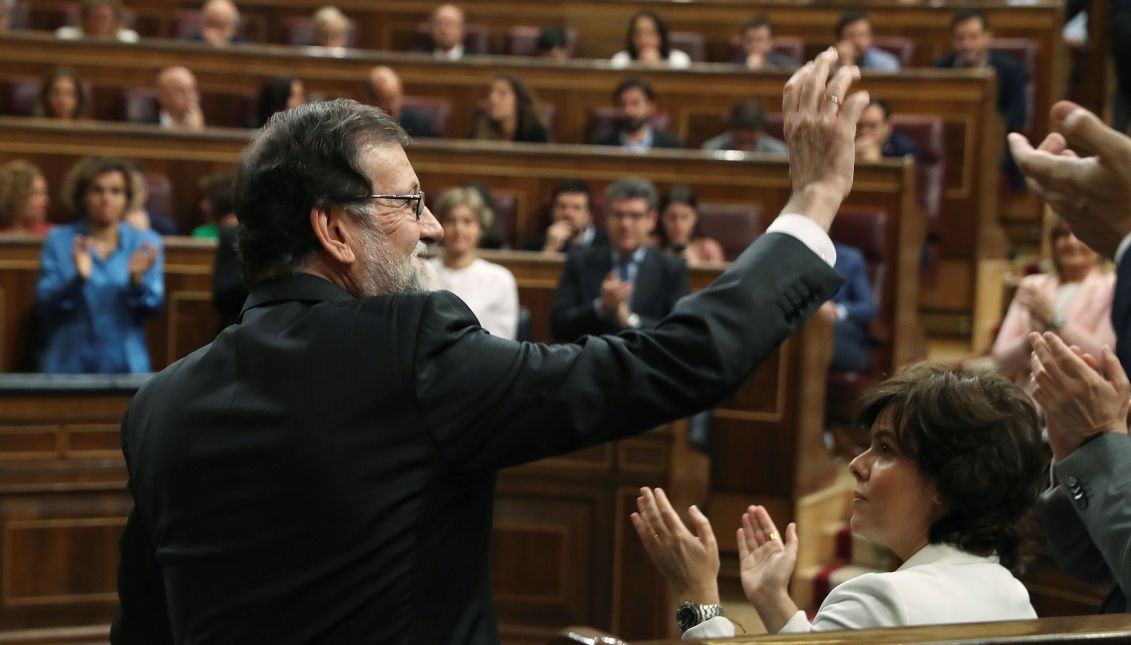
Bye bye, President Rajoy
Mariano Rajoy was ousted as Spain’s prime minister on Friday after a vote of no confidence in Parliament. A long-running corruption scandal had tainted his…
It was not the inability of his government to manage the Catalan separatist crisis - which has ended with two leaders of independentist grassroot platforms and several members of the Catalan government in prison - or the approval of the controversial "Ley Mordaza" (a controversial Citizen Security Law to regulate and fine certain public demonstrations of protest on the Internet or on the street), but, purely and harshly, corruption.
Spanish President Mariano Rajoy, of the conservative Popular Party (PP), had to say goodbye to his office on Friday after losing a vote of no confidence presented by Pedro Sánchez, leader of the opposition party. Sánchez, of the Socialist Party (PSOE), led the vote of no confidence after Spanish justice announced the harsh sentences for corruption against PP and 29 people linked to the Party. Spain’s National Court announced charges related to fraud, tax evasion and money laundering,
Among the accused was former treasurer of PP, Mr. Bárcenas, who was sentenced to 33 years in prison and fined about $51.3 million. Judges also ordered Partido Popular to pay a fine of more than $285,000 for operating the slush fund. Since the first corruption cases came to light, in 2009, Mr. Rajoy has been called to court, but always denied any involved. This week, the Spanish Justice also questioned the credibility of Mr. Rajoy’s court testimony.
Given the seriousness of the sentences, the Socialist Sanchez decided on Thursday to present a no-confidence motion against Rajoy. A risky measure, because Sanchez does not have too many allies in Congress. However, after eight hours of intense debate in Congress, the vote of no confidence finally got the support of the majority of the congressmen - including the Catalan and Basque nationalist parties - to "dismiss" President Rajoy, and Sanchez became the new president of Spain.
The funny anecdote of the day - if it can be called funny - was that during the almost 8 hours that the debate in the Congress lasted, President Rajoy - who already warned that he had no intention of resigning - was "hiding" in a restaurant Madrid, where he had time to have lunch, "merienda" and dinner, while the deputies decided their future in the hemicycle. His seat was occupied by the handbag of the vice president, Soraya Sánchez de Santamaría (and, of course, the image of the solitary bag occupying the president's seat became a viral joke in the social networks).
RELATED CONTENT
When leaving the restaurant, which filled with journalists and curious to discover that the acting president was there, Rajoy already knew that the new Spanish president was the Socialist Pedro Sanchez, who today will swear his position before King Felipe VI.
The corruption scandal took months - years - stalking the Popular Party, which despite everything could win the general elections of 2015, but without a majority in Parliament. (Rajoy ruled with the support of Ciudadanos, the newly created Spanish liberal-nationalist party founded by the young Albert Rivera and has gained great popularity in recent months thanks to his tough position with the Catalan independence movement).
Pedro Sánchez has many challenges ahead. First, and the most urgent, the Catalan crisis. His party was criticized by many Catalan citizens for having supported the government of Mariano Rajoy to approve the application of the controversial "article 155", an article of the Spanish Constitution that allows to abolish all the autonomic powers of a region in case of having challenged the law. In December of 2017, the government of Rajoy decided to apply Article 155 against Catalonia, after the nationalist parties there had gone ahead with the unilateral declaration of independence based on laws passed by a majority in the Catalan Parliament, but which were unconstitutional to the eyes of the Spanish justice. The approval of the 155 was made with the support of the Socialist Party and Ciudadanos, a party that polls say can wipe out in the next Spanish elections.
Despite criticism of the Socialists for having supported the hard line of Rajoy with Catalonia, the Catalan separatist parties yesterday gave their vote to support the non-confidence motion against Rajoy. In return, they have asked Sanchez to start the dialogue with Catalonia, which finally has a new president, also a separatist.
"My Government will be socialist, equal, pro-European, guarantor of budgetary stability, complying with its European duties; a Government that will fulfill and enforce the Constitution," declared the new president during his speech at the Congress, after winning the non-confidence vote. His message was also addressed to the European Union and the markets, given the concern arising from political instability in Italy and Spain, as reported in El País.
But nothing will be easy for President Sanchez, who only ahs 84 of the 350 seats in Congress and knows that his allies in the non-confidence motion were temporary.











LEAVE A COMMENT:
Join the discussion! Leave a comment.